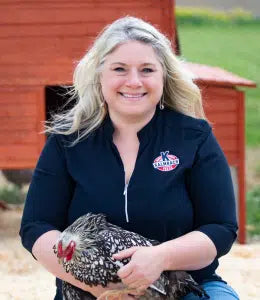When Can Baby Chicks Go Outside?

You finally took the leap and added some new chicks to your flock or family. Now you may be wondering when those new babies can start enjoying the great outdoors. Today, we are going to discuss some guidelines and tips for success when your new chicks are ready to go outside. We are also going to cover some specific tips related to outdoor access for young ducks, turkey poults, and guinea keets, too.
At What Age Can Baby Chicks Go Outside?
Chicks, ducklings, and poults are old enough to go outside when they are fully feathered and can adequately regulate their body temperature. This usually occurs around 3-4 weeks of age, depending on breed. In fact, USDA Certified Organic Standards, which require outdoor access, allow an exception and encourage confinement of young poultry until they are fully feathered. This is for the safety and health of your chicks, ducklings, and poults. Poultry use their feathers to help regulate their body temperature. Without feathers, a young chick must rely on a broody hen or a heat source in a brooder box to stay warm. Young chicks need to maintain a high body temperature and require their surroundings to be 90-95oF (decreasing 5oF with each week of life) in order to stay healthy and active. Once a chick has put on all of his or her feathers, their bodies are usually big enough and they can start regulating their body temperature adequately. Once you are confident that your chicks have the feather cover they need to go outside, consider the following information to keep your birds safe and healthy.
Outdoor Access Tip – Outside Start Times
It is a great big world out there and that can seem intimidating to a tiny chick. It may take some chicks, ducklings, or poults only a minute to dart outside, while it may take others 1+ hours to take their first step outdoors. It is best to start with a small window of time and to let young poultry outside for the first time when you can be there to watch them closely. A few hours after work or a nice weekend is the most ideal time to start outdoor access. Start with a 1-2 hour window before dusk and then increase the time outside each day. Starting before dusk makes managing the outdoor time easier because the chicks, ducklings, or poults will head inside their coop on their own as the sun starts to fade.
Outdoor Access Tip – Weather
Avoid letting your chicks outside for the first time on wet or rainy days. It is difficult for wet and/or chilled chicks to warm themselves and can cause a significant amount of stress to their bodies. Guinea keets are particularly vulnerable to dampness. Because guineas are native to Africa, young keets do best outdoors when it is hot and dry. On days when rain is in the forecast, it is best to keep chicks, ducklings, and poults younger than 3 months old confined if you cannot be home with them. Most young poultry will make their way back into the coop if it starts to rain. However, there are always some birds, particularly turkeys, which may huddle together outside during rain or thunderstorms. This is particularly dangerous because smaller or weaker birds on the bottom of the huddle may be injured or crushed. Never lock young birds outside with no access to a safe place to take shelter during bad weather.
Outdoor Access Tips – Preventing Predators
Three to four-week-old chicks are still very small. Even though they may be fully feathered, they are certainly prime targets for many types of predators. Predators that often avoid adult fowl will attack young chicks, if given the opportunity. Cats, rats, and snakes will usually avoid full-sized birds, but may be tempted by smaller chicks. A secure, covered run is the best outdoor solution for small chicks, ducklings, and poults. Make sure there are no gaps between the bottom of the run and the ground (buried runs are preferable!) and no way for a sneaky predator to gain access to your coop. If you do not have a run, it is best to stay very close to your young poultry while they are outside or wait until they are at least 3 months old to allow outdoor access. Never lock young birds outside with no access to a safe place to take shelter from predators.
Outdoor Access Tips – Ducklings
Baby ducks are able to swim almost from the time they hatch. You can allow baby ducks to swim at 1 week of age. However, keep in mind that 1-week-old ducklings do not have adequate feather cover to keep themselves warm. Swimming water must be warm and the ducklings should have quick and easy access to their heat source – a broody momma duck or a heat source in their brooder box – so they can warm their bodies. Young ducks will also get tired quickly, so swimming lessons should be very short. Baby ducks will be fully feathered by about 4 weeks of age, but they need another 2-3 weeks for their bodies to produce enough oil to protect their feathers from getting soaked. After their feathers are sufficiently oiled, ducks can enjoy swimming in all seasons!
